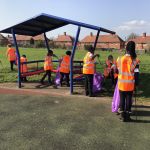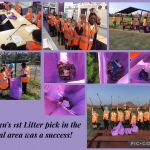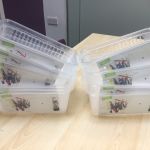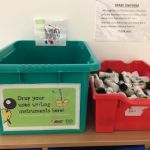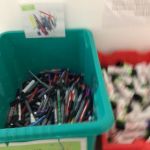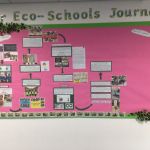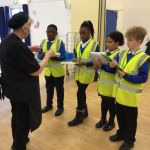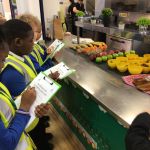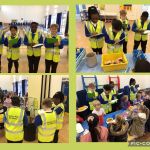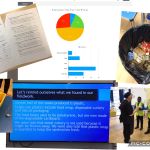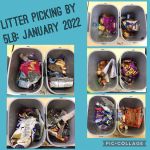Messages: Please remember to check your SPAM folder if you are awaiting a reply from us.
Team Name - Rosslyn Park Primary and Nursery School
| Team name | Team Name |
| School name | Rosslyn Park Primary and Nursery School |
| Website | http://www.rosslyn.nottingham.sch.uk/ |
Plastic Clever Challenge Status
| Challenge Status: Completed | Date joined: unknown | |||||||||||||||
| ||||||||||||||||
Plastic Clever Badges
| Challenge Status: Active (Round ) |
| Plastic Clever Badges Awarded |
| Not yet completed |
Competitions
Details of a new competition are coming soon.
Evidence Uploaded
Level 3: Video showing changes made and eco-schools board
- Posted on: March 30, 2022
Here is a video showing the changes we have made in school, our eco-school board, activism day and 2 more problems we wish to tackle.
litter picking in the local area around school
- Posted on: March 29, 2022
As part of ‘The Great British Spring Clean,’ we have pledged to pick litter in the local area around school.
Each week, 10 children from year 1-6 will be taking part in this. We discussed health and safety before we left school. On return, we packed away the equipment and discussed how the session went,whilst having juice and fruit.
It was the perfect weather for it on Friday! We collected 4 bag fulls!
photo of changes made
- Posted on: March 23, 2022
The children have lunch in the classrooms on a Tuesday and Wednesday. Previously, their hot dinner was served in polystyrene containers and plastic cutlery was used. We now have hot dinners served in biodegradable cardboard containers. Instead of plastic cutlery, metal cutlery is used.
In addition to this, we have signed up with Terracycle. We get through hundreds of whiteboard pens, glue sticks and other stationary, most of which are recyclable. We did some research and signed up with TerraCycle. At TerraCycle, any brand of pen, felt tip pen, highlighter, whiteboard/flip chart marker,correction fluid pot/tape, and mechanical pencils with rubbers can be recycled. Once collected, the materials are sorted, cleaned,and melted into hard plastic that can be remoulded to make new recycled products.
Each class has been given a basket, with a reminder poster of what can go in it. Empty glue sticks can go in the basket too as these will be recycled separately. At the end of each term, I will take the boxes to a drop off point.
Here is a photo of our Eco-Schools board, where all the work we have done is displayed.
Campaign in action – letters written to the head teacher proposing changes to be made in school
- Posted on: March 7, 2022
Our year 5 children have been learning all about where our waste goes. After completing a waste audit of lunch in the classroom and in the dinner hall, the children were eager and inspired to make changes in school. As a result, in their English lessons they wrote letters to the head teacher proposing changes we could make in school to reduce plastic waste.
Additionally, our 4 Eco-warriors had a meeting with the office manager, to propose the changes they had in mind. This meeting went exceptionally well, as Mr Mullahy was on board right away. Below is a photo attached of the meeting taking place and then pupils reporting back to their classes.
The results are:
✅Biodegradable lunch containers for dinners in class (2 days a week)
✅Metal cutlery to be used instead of single use plastic cutlery when eating in the classroom
✅A vegan option on the menu
✅Reusable ice packs for first aid
Action to reduce plastic waste
- Posted on: March 7, 2022
I have attached a pdf of the Eco-Schools Action plan. Our aim of reducing plastic waste in school ties in across the 3 areas we are working on.
waste audit in classroom when eating in the class and in the dinner hall when days children eat in the hall.
- Posted on: March 7, 2022
We have been busy in year 5 with our geography focus! In the next few weeks we are learning all about the waste we produce, where it goes and how it affects our planet.
To launch this topic, we did some investigating on how much waste we produce as a class. The children were asked to hold onto their waste from lunch time so that we could do a ‘waste audit.’
We sorted all our waste into groups of paper/cardboard, plastic,metal and food waste. We collated the information and created a class tally, followed by a life size bar graph. Finally, the children used this information to try and estimate how much waste we potentially produce as a whole school, on a daily basis.
There were some amazing discussions taking place!
Our Eco-warriors went to do a waste audit in the dinner hall too. Below are pictures of them, followed by a pie chart from their results. They also had some questions for the kitchen manager. We then used this information to make suggestions for changes to be made in our school. The children wrote letters to the headteacher with suggestions, and then met with the office manager to suggest changes to make.
Video sharing why we want to become a plastic clever school
- Posted on: March 4, 2022
Here is a short video of our Eco-Committee members sharing why we would like to be a ‘plastic clever school.’
Starting our litter picking journey
- Posted on: March 1, 2022
Everyday, 4 children from year 5/6 are on litter picking duty. They walk around the school playground in pairs, with one caddy bin between them. They use the bins as they can be emptied, washed and used again daily, avoiding use of plastic bags. They return with the bins almost half full everyday.
This photo shows what a typical litter pick, across one week looks like.
In the next few weeks, as part of ‘The Great British Spring Clean,’ we will be going outside of school in the local area to litter pick, one afternoon a week. We will have 10 different volunteers across year 1-6 every week. Through this, the year 5 and 6 children can support the younger children, engaging in conversations around what they have learnt about waste and where it goes.
Raising awareness on the plastic pollution problem
- Posted on: March 1, 2022
Four of our children went to Primary Parliament, which was based around COP26. They were joined by children from 8 other schools. The aim of the day was to discuss factors which contribute to climate change and think of ways to become ‘greener’. The children then made ‘green machines,’ which were their inventions, to help reduce the speed of our climate changing.
Our children worked collaboratively with children from other schools, creating a model of a fruit tree planting machine, and a road vacuum, which collects and sorts waste into recyclable, compost etc. At the end of the day, they presented their ideas to all the other children, adults and a local councillor.
Upon return to school, the children felt passionately about what they had learnt and engaged in. They put together a presentation for an assembly. They were so inspired, that they came up with many suggestions of changes we could make at home and at school.
Conveniently, our next topic was ‘Where does our waste go?’ This would tie in perfectly to investigate our own waste and to find out more about plastic pollution specifically.


